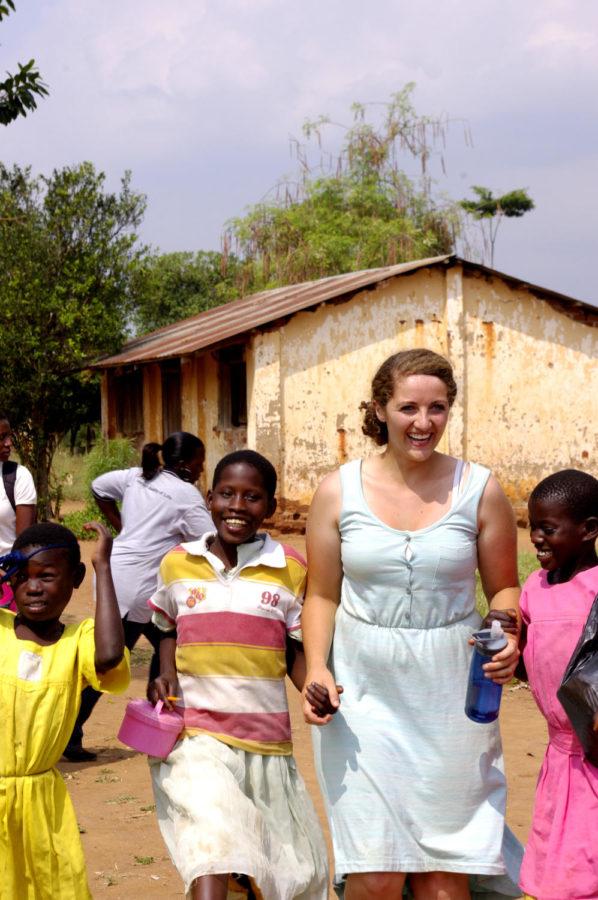Students find unique internships, work in Uganda
Julie Perreault, junior in global resource systems, plays with local children on the service learning trip to Uganda.
September 4, 2013
The developing country of Uganda is getting unique help from ISU students.
Since 2006, the College of Agriculture and Life Sciences has been offering internships to anyone wanting to make a difference in Uganda.
This summer, 12 students (eight service learning members and four interns) seized that opportunity in the rural district of Kamuli and in the capital city of Kampala in Uganda.
Undergraduates who visit the country for their six-week internships team up with Ugandan students from Makerere University to work on school gardens as part of the service learning program. Malnutrition is a large problem, especially among Ugandan youth.
Students also teach the children how to raise crops and chickens to build a healthier school lunch program, hopeful the teaching process will cycle in later generations.
“It was very difficult to see malnutrition over there,” said Jake Swanson, senior in global resource systems. “Coming back, one of the hardest things was to see people throw away food.”
Hannah Darr, junior in global resource systems, visited Uganda as part of the service learning program.
“[Working with the kids in Uganda] really put into perspective how blessed I am to live where I do, and the opportunities I have,” Darr said. “I learned so much about life from the kids there.”
Undergraduates also take on small projects with the collegiate Ugandans, like building chicken houses and beehives with local materials; they also build tip taps at the schools for children to wash their hands, encouraging cleanliness.
“We built brick tip taps at the school I helped with, so they wouldn’t be destroyed by termites and things like that,” said Julie Perreault, junior in global resource systems. “We also fixed some drainage issues by the bathrooms so kids wouldn’t have to walk through contaminated waste.”
On the graduate level, the opportunities become more broad and major-oriented. Students from at least four colleges within Iowa State have visited Uganda.
Students have helped Ugandans better organize food distribution and analyze the nutritional needs of pregnant mothers, as well as help farmers communicate more effectively for business and test their soils.
“If you have this much going on in agriculture and other areas,” said David Acker, associate dean in the College of Agriculture. “You can’t really keep it to yourself. We felt like having a at least one project the whole university could get involved with would be a good idea.”
Swanson focused on health his six weeks in Uganda. He worked in a hospital three to four days a week and even assisted in the delivery of two newborns. Swanson also studied tropical diseases and the Ugandan health care system.
“By sending students over to Uganda, I think we really try to make a difference, and in turn, we get a lot of really good experience,” Swanson said. “It just really changes your perspective on Uganda.”
Officials said that if the College of Agriculture can get the money together, they’d like to see more students volunteering their time in Uganda.
They’d also like to focus on the gap between infants and primary school — preschoolers — to identify their major learning and health needs.
“You go to Uganda not sure what to expect,” Swanson said. “You hear a lot of the negative things about Africa, but there are a lot of great things that tend to get overshadowed. Ugandans are the happiest people on the entire planet — even when they have absolutely nothing.”

















